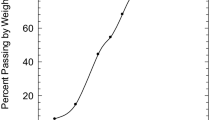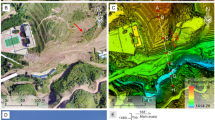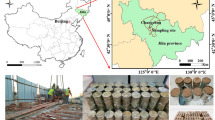Abstract
IN a previous communication1, an anomalous difference was pointed out between two supposedly similar geological deposits from widely separated regions of the world. Whereas a relationship between sensitivity (the ratio of undisturbed shear strength to remoulded shear strength) and pore-water salt concentration has been reported for some Norwegian marine soils, this was not true for Leda clay from the Ottawa–Hull area in the St. Lawrence Lowland region of eastern Canada.
This is a preview of subscription content, access via your institution
Access options
Subscribe to this journal
Receive 51 print issues and online access
$199.00 per year
only $3.90 per issue
Buy this article
- Purchase on Springer Link
- Instant access to full article PDF
Prices may be subject to local taxes which are calculated during checkout
Similar content being viewed by others
References
Penner, E., Nature, 197, 347 (1963).
Gadd, N. R., Paper 62–16, Geol. Surv. Canada (1962).
Author information
Authors and Affiliations
Rights and permissions
About this article
Cite this article
PENNER, E. Studies of Sensitivity and Electro-kinetic Potential in Leda Clay. Nature 204, 808–809 (1964). https://doi.org/10.1038/204808a0
Issue Date:
DOI: https://doi.org/10.1038/204808a0
Comments
By submitting a comment you agree to abide by our Terms and Community Guidelines. If you find something abusive or that does not comply with our terms or guidelines please flag it as inappropriate.



